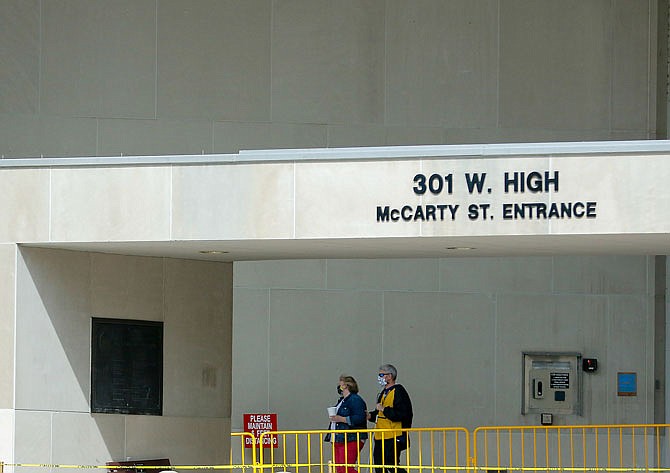When more than 2,200 state employees who had been working remotely come back to their offices Monday, they - and any members of the public who come by - are to find a much more controlled environment than before the COVID-19 pandemic.
Missouri Office of Administration Commissioner Sarah Steelman said as of Friday, 14,930 state workers - almost 40 percent of the workforce - were working remotely, with 21,771 remaining physically on the job.
As the current statewide stay-at-home order lifts at midnight Monday morning and the reopening of the state begins under a new public health order that lasts through at least 11:59 p.m. May 31, Steelman said major office buildings throughout the state will open back up to the public, and 2,256 state workers will also return to their buildings.
State office buildings have been closed to the public since March 24.
Departments will individually decide which buildings to open, Steelman said, and services that will be open in office buildings include motor vehicles and driver licenses, Bureau of Vital Records, motor vehicle inspections and driver's tests.
The Missouri National Guard will help departments with screenings for the public and employees as they enter buildings, Steelman said.
More specifically, state office buildings with 300 or more employees have been selected to have screenings.
In Jefferson City, that includes the Capitol; the Harry S. Truman, Lewis and Clark, Thomas Jefferson and Howerton state office buildings; and the buildings at 920 and 930 Wildwood Drive and 3418 Knipp Drive.
In most cases, as entrances allow, there will separate lines for screening employees and the public, according to information from the OA.
The screenings are expected to take less than 30 seconds.
Smaller facilities are to be given flyers to post at entrances to remind people to self-screen.
While there will not be temperature screenings, state employees who do not pass the screening questions are to be asked to return home, tell their supervisor and contact their physician about symptoms.
Guard members are to advise members of the public to not enter a building if they do not pass the same screening questions.
Vendors working in buildings will also be screened.
Members of the public who do enter a building will also be required to sign in and provide their contact information in order to keep track of anyone who may potentially be exposed in the event someone is infected with COVID-19.
Though available pens are to be sanitized after each use and hand sanitizer should be available for the public, supervisors can complete the contact form for someone if they are uncomfortable.
If someone still refuses to give their contact information or conduct their business online, over the phone or by mail, they can be asked to leave.
The OA did not immediately respond to a question Friday about whether it's ultimately voluntary for someone to leave if asked - particularly if they do not pass screening questions.
If, however, a member of the public "is confrontational and will not follow the rules," employees in Jefferson City are to call the Capitol Police.
Outside of Jefferson City, employees who may find themselves in the same situation are to call local law enforcement, or, if available, contracted building security.
In general, the public is encouraged to do their business online, by mail or over the phone. Appointment-only services are also to be "used to the greatest extent possible to help maintain social distancing," so long as appointment-only services continue to fulfill a department's mission.
Lobbies are to be limited to no more than one person per 150 square feet. A department may also designate a greeter to limit the number of people moving in and out of a reception area.
It's "highly recommended" that employees wear face coverings, but it's not required, except for certain positions in the state workforce such as providing direct care to clients in residential facilities.
Departments can order face coverings for their employees through Missouri Vocational Enterprises.
MVE operates factories within Missouri Department of Corrections prisons to provide job training for offenders, and MVE sewing factories have been producing fabric face covers.
The Centers for Disease Control and Prevention also recommends all people wear cloth face coverings in public settings where social distancing may be difficult, such as grocery stores and pharmacies.
This is primarily to prevent people who don't know they're infected with COVID-19 from unknowingly infecting someone else.
More information on face masks - including how to make one from something like a bandana or T-shirt and rubber bands - is available at www.cdc.gov/coronavirus/2019-ncov/prevent-getting-sick/cloth-face-cover.html.
State buildings are to be cleaned daily, "with an emphasis on disinfecting touch surfaces," in addition to being consistent with earlier guidance on cleaning during the pandemic.
Even as things begin to reopen, state departments will continue to encourage employees to work remotely when possible.
Between April 29 and Steelman speaking May 1, the number of state employees working remotely had increased by 26 people, though the number working in-person had also increased by 456.
As of Friday, Steelman said 3,915 employees could not report for work, were on administrative leave or could not work for other reasons.

